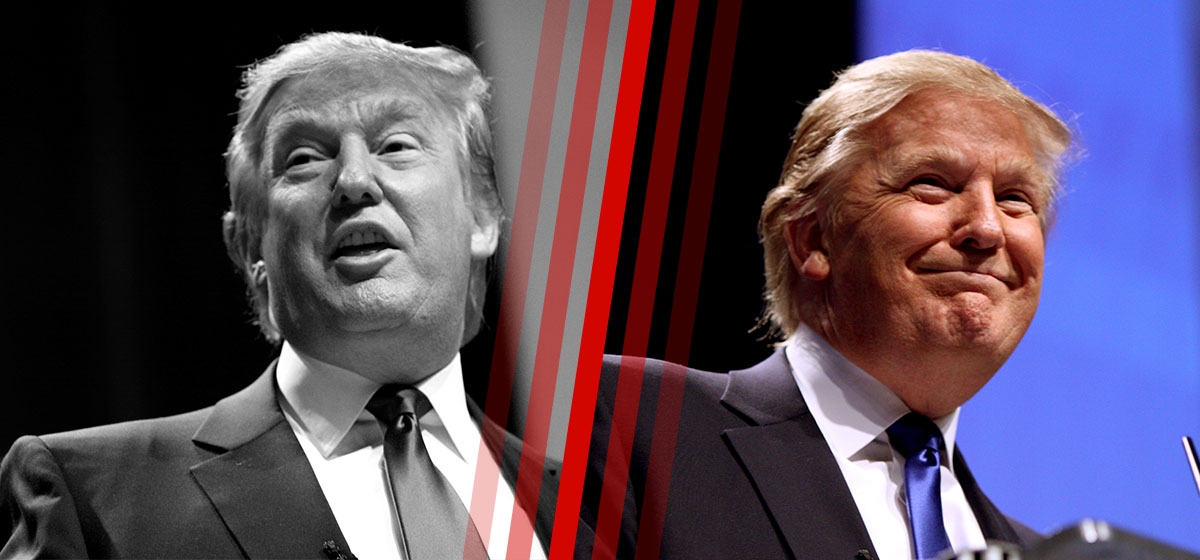Explaining Donald Trump, the Conclusion

I have met the enemy, and he is me. (What Trump, channeling Pogo, should be saying to himself every morning.)
Can Trump turn it around? No one knows, of course, but if my only slightly tongue-in-cheek analysis is correct, the best hope for Trump is that his dismal experience to date will prove to be a wake-up call.
We observed in the case of Steve Jobs that a series of calamitous experiences—being fired from his own company, launching a new company that failed utterly—helped turn his head around. Getting married and starting a family helped as well, so that by the time Jobs returned to Apple in the late 1990s he had “matured.”
The word “matured,” of course, has a special meaning in the case of Mega Entrepreneurial Personalities (MEPs). It didn’t mean that Jobs had mellowed or that he had developed the capacity to empathize with others or to live by the same rules as everyone else. It meant that he had learned to focus his attention on a few projects that really mattered to him and to Apple. The rest of the company could operate normally and, while the important projects still felt the full brunt of his searing personality, Jobs was able to back off just before he blew everything up.
It’s possible to analogize Trump’s first six months in office to Jobs’ experience at Apple I and NeXT. Perhaps the poor results Trump has achieved so far will cause him to mature, to learn to focus only on those things that really matter and even there to control himself when it looks as though he is about to blow an important initiative out of the water. But is it likely? And even if it happened, would it matter?
I have no idea how likely it is that Trump will learn from his experiences in high office, and neither does anyone else (although everyone thinks they know). But even if Trump should experience a Jobs-like transformation, it might simply be too late because of the second trait I’ve pinpointed: Trump has never held office. He knows almost nothing about how Washington works, nothing about the traditions and responsibilities and processes and procedures of the Presidency. On top of that, he doesn’t know anyone—or trust anyone—who does know about these things.
As Trump has stormed around and stumbled around, his approval ratings have plummeted and he is now the most unpopular President since at least World War II. Still, it’s important not to read too much into the poll numbers. If we disaggregate the ratings what we find is that, as with the Conservative Party in the UK, Trump is so unpopular with younger people that it drags down his overall ratings. Among voters over 40, Trump’s approval ratings are above 50%. If you believe that young people own the future, Trump is certainly in trouble. On the other hand, if you believe that young people are essentially blockheads but that they will smarten up in a few decades, the polls probably don’t mean much.
More problematically, a matured and transformed Trump who was focused like a laser on a few key initiatives would still be a Trump who lacks the tools to accomplish much. Domestic policy doesn’t get made by issuing orders or tweeting or storming around the Oval Office raging at your enemies. It gets made through a long and unwieldy process that begins with hiring policy staffers who know how to manage the maze that is Washington, D.C.—ideologues have their uses, but this isn’t it. Then there is the hard slogging of drafting policy proposals, inviting guidance and comment from Congress, involving policy wonks and lawyers, developing a communications strategy, blah, blah, blah. None of this is happening.
In the realm of foreign policy a President has greater leeway, but even there nothing good will come of White House initiatives unless they are followed up on by a small army of under secretaries and assistant secretaries, the people who do the day-to-day work at State and Defense. Almost none of these people are in place, there are literally hundreds of vacancies. Why? The Trump team views the obvious candidates as unsatisfactory because they (a) opposed his campaign, (b) are Democrats, or (c) Trump doesn’t know them. Ironically, the result of this is that State and Defense are being run by the “deep state,” that is, the permanent bureaucrats who run Washington the way they want to regardless of what the President wants.
When Steve Jobs returned to Apple, the company was unquestionably bloated beyond recognition—but underneath that bloat Apple had great bones. Jobs focused on the bloat and vigorously—one might say viciously—pared it away. What was left was a small team of “A” players—designers, engineers, marketers, etc.—who could focus on a few key initiatives and produce peerless products. By contrast, the Trump White House was empty when Trump arrived—there were no great bones to work on and none have been assembled.
We often say of a successful President that he “grew in office.” If I could give Donald Trump one piece of advice it would be that he needs to shrink in office, to commandeer his oversized personality, to pare down the scattershot activity, to focus on a few initiatives that matter, to set the agenda but then get out of the way and let the experienced Washington hands guide him through the maze.
Will he do it? It’s not impossible, and people have bet against Trump and lost before. Still, I wouldn’t bet the farm on it.
Next up: Cash Is King





